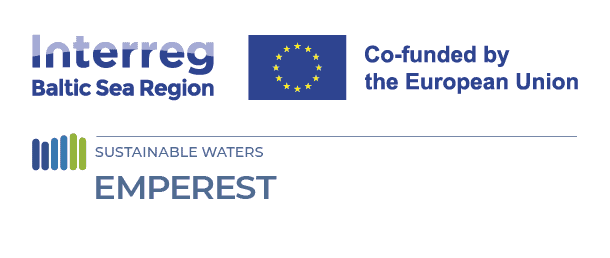
Setting the framework for the training material
18 September 2023
To achieve this purpose, the team of the Berlin University of Technology (TUB) is involved at all aspects of the EMPEREST project, i.e. the regional strategies for monitoring and assessment of PFAS and other persistent micropollutants, advanced wastewater treatment for their removal, and risk assessment for cities. We are participating at all activities and working teams, not only to contribute with our experience and expertise, but to follow the evolvement of the project at all levels and to integrate the experience and knowledge gained and the respective results in the training material.
The training package will be developed based on the demands of the Baltic Sea Region countries and of the specific target groups, i.e. infrastructure and service providers in the water/wastewater sector, local and national authorities, international governmental organisations, national water associations, or environmental training centres. It will include theoretical and practical training courses, with information relevant to beginner’s up to expert’s level. The result will be a transferable training package, covering the knowledge gap about PFAS in the BSR region and beyond, and serving the dissemination of the project’s results and the efficient capacity building.
Defining the needs
The Kick-off workshop in Turku was the first official in-person meeting in the frame of the project and a great opportunity for the TUB team to reach out the target groups. An investigation was conducted regarding the specific interests and needs for knowledge of the consortium partners and key stakeholders.
It was already clear that the development of a specialised training material to cover the needs of different target groups is a particularly challenging task, which was further verified by the diverse results of the survey. Different expectations from the training material and various topics of interest were expressed, whereas almost all participants agreed on the importance of public and social media and other communication tools to increase the awareness regarding PFAS and other micropollutants. In addition, through exchange with experts from target groups in external events organized by TUB, such as representatives of the German Environmental Agency (UBA), Berlin Senate, and industry, further information regarding PFAS and the needs of the target groups was acquired.
Creating training material
A special feature at all project’s events is the participation of external experts. Invited speakers from the education, service providers of the water and wastewater sectors, governmental organisations, environmental agencies, etc., share their knowledge and experience related to PFAS. Their contribution is crucial for the capacity building of the project’s partners, whereas their presentations are recorded and are being processed by the TUB team to create educational videos. The presentations in the kick-off workshop in Turku were recorded by the TUAS team and the presentations in the Zero PFAS Roadshow in Stockholm and the workshop in Riga were recorded by the TUB team.
Conceptual framework
The intensive literature survey, and the feedback of the project’s partners regarding questionnaires and educational videos are being elaborated to create the conceptual framework, the roadmap for the development of the training material. TUB initiated also the assembling of the training task force (TTF), a working group consisting of specialists which can support the efforts towards the framework, coming from the education (TUAS, UT), but also from HELCOM, UBC and the responsible for the transfer of the training material DWA. Already two meetings were held; the potential topics and formats for the training material were discussed, and the next steps were planned.
The draft conceptual framework is being prepared and educational videos were distributed among the partners. Till the end of the year our efforts will be focused on the finalization of the conceptual framework and the further development of educational videos.
Written by: Dr. Nikolaos Tzoupanos, Technische Universität Berlin





